China: End ideological “Zero COVID” and put human life and dignity first
November 16, 2022 Comments Off on China: End ideological “Zero COVID” and put human life and dignity first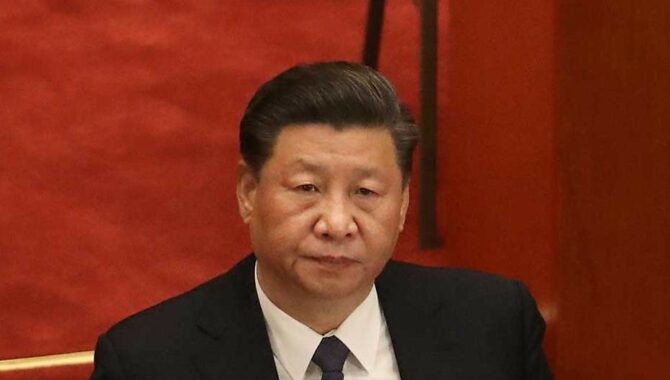
Across China, enforcement of Xi Jinping’s “Zero COVID” policy has not only disrupted the economy and the social fabric, but also has seriously violated human rights. It has particularly impacted the lives of people dealing with health emergencies and contributed to increased mental health issues.
On November 11, the government announced 20 measures to “refine” the policy and make it more efficiently implemented. However, this was not a relaxation of the strict “Zero COVID” policy. On November 15, the People’s Daily ran a special “zhongyin” editorial –zhongyin (仲音) implying the voice of the Central leadership of the Chinese Communist Party – to say that the new COVID measures do not imply “relaxation of prevention and control, nor is it a call to let go or adopt the ‘lying flat’ approach”.
CHRD urges the Chinese government to scrap any unnecessarily burdensome measures and immediately end the “Zero COVID” policy. The government should lift unnecessary restrictions on freedom of movement and expression and adopt pandemic-control health measures recommended by the World Health Organization in order to minimize the detrimental impacts, save lives, protect public health.
There are enormous variations in the way local officials’ enforce the top-down and ideologically driven “Zero COVID” policy, and some localities, especially in rural areas, may have experienced few of the disruptions mentioned below. And yet much of China has suffered from negative human rights impacts, with the measures that are clearly abusive of human rights including the arbitrary use of the health code system and prolonged lockdowns’ harmful impact on the lives of the needy, vulnerable, and disadvantaged population groups.
Using COVID Health Code as a tool of surveillance and control
Over the past three years, ostensibly to limit COVID transmission, Chinese authorities have enforced a passport-like system to restrict movement of Chinese people inside the country. The system works on the basis of the individuals’ relative COVID risk as communicated through “health codes” on cellphone apps. The apps, usually operated via either Tencent’s WeChat or Ant Group’s Alipay, generate QR codes, which show green, yellow, or red QR codes, indicating COVID risk levels.
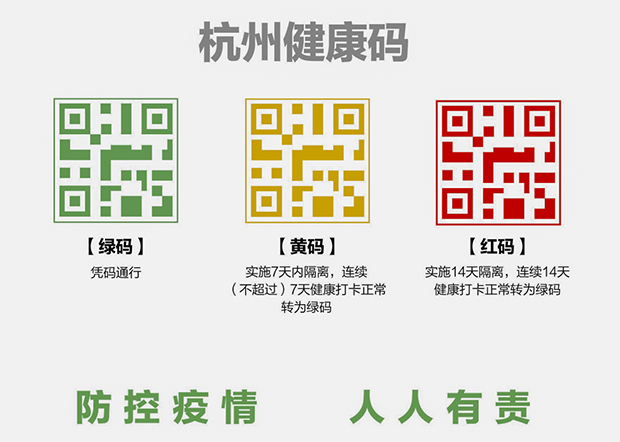
Showing one’s health code is necessary to travel between cities or access public transportation, get into public buildings, shopping centers, hospitals, hotels, and so on. A person must voluntarily enter their personal information into the app – their real name, birthday, travel history, mobile phone number, national identification number, and health status. By using real time tracking technology, the app algorithms also use big data from known COVID outbreaks, where other known COVID positive people have traveled, and any likely exposure of an individual to these known COVID cases, in determining the risk of level of an individual.
From information that CHRD gathered from human rights defenders inside the country, the health code system has provided the government with new means to control and monitor the movement of activists and critics of the government.
For example, Ye Zhong, a petitioner from Fuzhou, described the absurd situation he found himself stuck in. The police took away his cellphone and national ID card when they forced him to return from Beijing, where he tried to lodge grievances against officials, ahead of the 20th CCP Congress:
“As COVID cases in Fuzhou exploded over the last ten days, the city government required residents to get COVID tests every day. I wanted to pro-actively comply with the government’s requests, but since they refused to give back my mobile phone, I had not been able to do so. I called the police twice, and they told me my health code was ‘yellow’ but they couldn’t help me in getting tested. At the same time, since they had taken my ID card, I could not add money to my mobile phone account, which requires a real name ID. Without a phone card, I can’t have a health code in my own name, and thus can’t enter the ‘yellow’ line at the COVID testing area to get a COVID test [which could potentially change the color of the code to green]. I’m currently without a phone, without a phone card, without a health code, and simply can’t get a COVID test.
Many housing compounds require that a person have a negative test within the past 24 hours and a ‘green’ health code to enter, and many companies, malls, and public buildings require the same. I’m kept out of my home, since I can’t enter my compound, nor could I get a hotel room, and can only live by the roadside.”
Ji Xiaolong, an online citizen reporter based in Shanghai, also had his phone and ID card confiscated by police in May 2022, after he posted complaints on social media about Shanghai’s COVID lockdown. Ji told Radio Free Asia: “They confiscated my ID card, passport and cell phone, which has my Alipay account,” Ji said. “I can’t get a new SIM card because they took my ID. So now I can’t go anywhere because you have to scan the [COVID-19] health code app to get anywhere.”
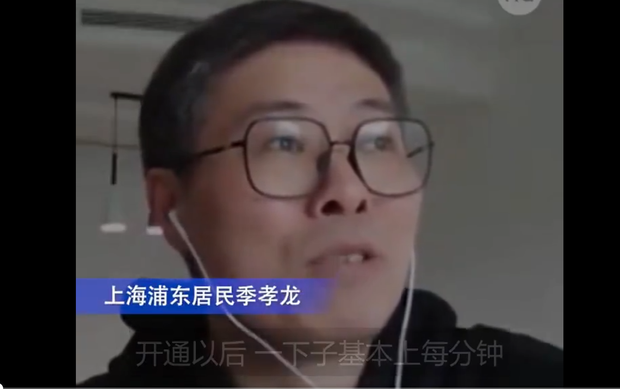
Ji was taken away by police on August 31 and arrested on September 23 on the charge of “picking quarrels and provoking trouble”, likely in retaliation for an open letter he wrote criticizing then-Party Secretary of Shanghai Li Qiang and Xi Jinping. He is currently being detained in a room of 60+ people, which is only meant for 25 people, and he is suffering from extreme tooth pain and is being prevented from seeing a dentist.
Chen Zijuan, the wife of detained human rights lawyer Chang Weiping, had her health code arbitrarily switched to the yellow by an official in the Xi’an city government, who was unhappy with her attitude. Ms. Chen, in a long blog post, told the story of how she spent a whole day in a flower shop trying calling COVID prevention officials and dealing with officials responsible for the COVID bureaucracy. She didn’t understand why her health code was turned to yellow even though she had a negative COVID test the day before traveling to Xi’an and she was coming from a low-risk area.
In another instance, when Chen was trying to travel to attend her husband’s trial in a remote part of Shaanxi province, officials tried to prevent her from doing so by using COVID protocols as a pretext. In total, 18 police vehicles, ambulances, and government cars – under the pretext of COVID enforcement – surrounded her car on the road to the courthouse and would not let her car to proceed further.
A Jiangxi province-based activist, Liu Ping, a former prisoner of conscience, wrote on social media that she was on a business trip in Hangzhou in August and noticed that her health code suddenly turned to red and a notice was sent to her demanding that she quarantine at her residence or a hotel. Liu said that she was confronted by several COVID enforcers, who wanted her to get in an ambulance to a quarantine site in a hotel. Liu asked them to show the legal document for forcing her into a quarantine. One enforcer replied that there were no legal procedures and they were just following orders and they only given her name and location. The ordeal ended a day later when she tested negative.
Perhaps most notoriously, people who had gathered to protest against local banks where they could not withdraw money from their accounts in Henan province in June found that their health codes all turned to red afterward. The incident caused on outcry and drew a lot of attention nationwide on the Internet. Even the state media published articles to denounce the Henan authorities’ abuse of the health code system.
Enforcing lockdowns despite the detrimental impact
As CHRD has previous documented, prolonged lockdowns result in disastrous consequences, including preventable deaths due to blocked access to emergency care and other violations of human rights. As authorities continue to uphold Xi Jinping’s “Zero COVID” policy, such disastrous ramifications have spread and amplified in recent months.
Non-COVID Deaths due to blocked access to medical facilities under lockdown
While the government maintained a tight lid on the death toll in the early 2020 COVID outbreak, some recent allegations of denial of medical care leading to likely preventable non-COVID related deaths broke through the severely censored Chinese social media, which have often been quickly deleted. In one widely shared story, for example, a 3-year-old boy died after being denied emergency care even though the family lived ten minutes away from a hospital in Lanzhou. His father called the emergency four times, but no medical assistance arrived because the family lived in a “high risk area.”
There have been other social media posts about deaths due to delayed or blocked access to emergency care, such as one October incident in Sichuan, as well as about incidents of apparent suicides during forced quarantine or lockdowns in Ningxia Hui Autonomous Region, Inner Mongolia Autonomous Region, and Henan Province, just in the past two months, indicating a likely growing public mental health crisis due to social isolation, family separation, deprivation of access to basic goods, under long lockdowns. Local activists collected and reposted these reports, though CHRD has not been able to verify them. Radio Free Asia also reported that the government has classified the number of suicides as a state secret. Scholars have raised concerns about a mental health crisis while videos disclosing incidents of suicide continue to emerge online.
Many localities in China appear to remain in rolling mass lockdowns, including economic powerhouses like the city of Guangzhou, where violent protests in Haizhu District against the lockdown occurred on November 14.

The industrial province of Henan is also on lockdown, and one video recently emerged of two COVID enforcers beating a man in the city of Xuchang who claimed to have been starving after 28 days of lockdown.
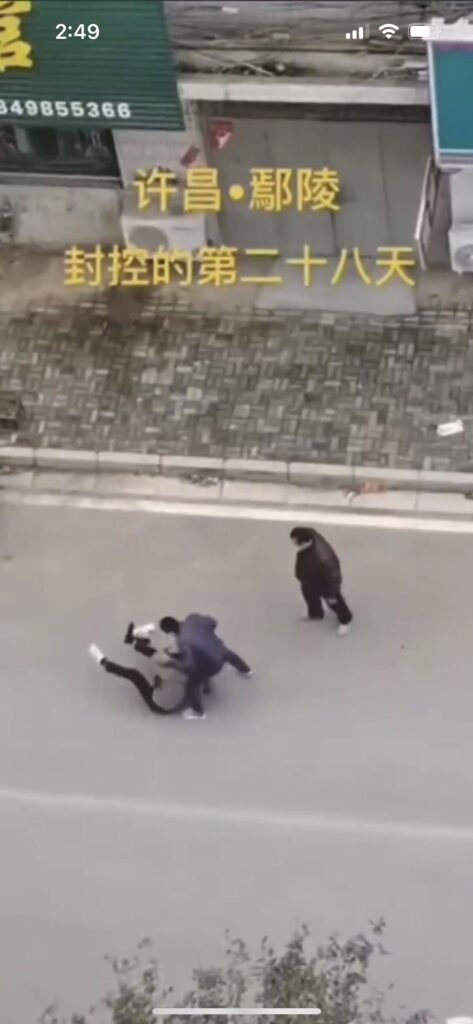
And yet the lockdowns appear to be even more chaotic and callous in the already tightly controlled ethnic minorities regions.
In the Xinjiang Uyghur Autonomous Region, on November 13, more than 100 days into a lockdown in the capital of Urumqi, a video emerged showing people in a housing compound yelling from their windows for help, apparently due to lack of food. Another video emerged on November 7 of a man outside a hospital, asking three lockdown enforcers to allow his pregnant wife, who was in labor, to be admitted to the hospital. The man pointed to four vehicles that were waiting, and said that there were four pregnant women, three of which had already broken their water, inside of the cars and also waiting to get into the hospital. However, the enforcers refused to let them enter or provide any explanation for denying the women in labor admission into the hospital.
Jaudat Abas, a Tatar man living abroad, said on Twitter that his father, Abdurehim Abas, a former education official in Urumqi and founder of New Light Education Center, died in November from a heart attack. Jaudat Abas told CHRD that his father was unable to receive his medical assistance due to the lockdown.
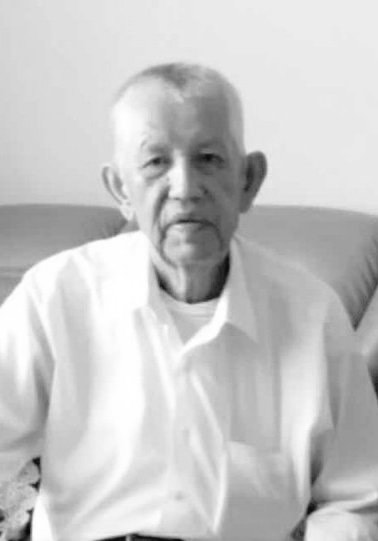
Jaudat Abas’s brother, Shafkat Abas, an ethnic Tatar doctor who specialized in traditional Uyghur medicine, has been arbitrarily detained since 2017, and the UN Working Group on Enforced and Involuntary Disappearances has made reference to his case.

Jaudat Abas’s mother, Zulfiya Abas, who is in her 80’s, is also suffering from heart and blood pressure illnesses without regular access to her medicine. As Shafkat Abas is in prison and her husband has died, she currently has no one to help take care of her daily needs.
Radio Free Asia reported that satellite imagery showed large-scale construction of makeshift quarantine sites in Xinjiang. They also reported that many videos clippings from quarantine facilities showed unsanitary conditions and shortages of food and medicine.
In Tibet, where lockdowns have been imposed for months, an extensive analysis by Tibetologist Robert Barnett showed that the government had built many makeshift quarantine centers (known as fangcang). Barnett, using data from government sources, estimated that 140,000 people were in fangcang or had spent time in such facilities, representing nearly 15 percent of the Lhasa population. Videos and internet posts showed that the conditions in such facilities were often filthy and lacking proper food and medicine.
However, lockdowns, quarantines, and burdensome daily tests, have met with online expression of dissent and protests, including violence against protesters, due to the massive social economic disruptions. A video circulating online of lockdown enforcers beating and kicking people who were apparently trying to escape lockdowns in Shandong.
Most notably, production at Foxconn’s largest factory in Henan was interrupted by workers fleeing on foot from the restrictive lockdowns after an outbreak of COVID occurred at the factory. This Foxconn factory, which usually has 200,000 workers who make and assemble parts for Apple, had instituted a “closed-loop system” to prevent COVID outbreaks. This system prevents workers from leaving the factory and the dormitory compound. Workers related on social media how they had to jump over metal gates to escape the lockdown, revealing conditions that raise concerns about possible forced labor and labor rights violations inside this Foxconn facility.
“Zero COVID” pursuits persist despite disastrous outcomes
No matter what the cost to human life, not to mention the tanking Chinese economy, that the “Zero COVID” policy has exacted, the policy will persist since it is dictated by China’s paramount leader Xi Jinping, whose total control of the country’s government, military, and economy is unconstrained. Xi has made the “Zero COVID” policy a part of the self-identity of his dictatorial rule. Officials at all levels of the government would face potential demotion or punishment if they dare to subject the policy measures to significant tweaking or modification on grounds of pragmatic or effective public health protection.
On March 17, 2022, as China was experiencing a mini surge in cases in some provinces, Xi Jinping renewed the uncompromising tone in a speech to the Standing Committee of the Politburo. Xi demanded that Party members must maintain “dynamic Zero COVID, and swiftly constrain the first signs of spread of the virus.” Crucially, Xi elevated this to the top priority and connected it with the Party’s international and domestic strategic needs, including the need for a smooth-running of the Party’s 20th Congress.
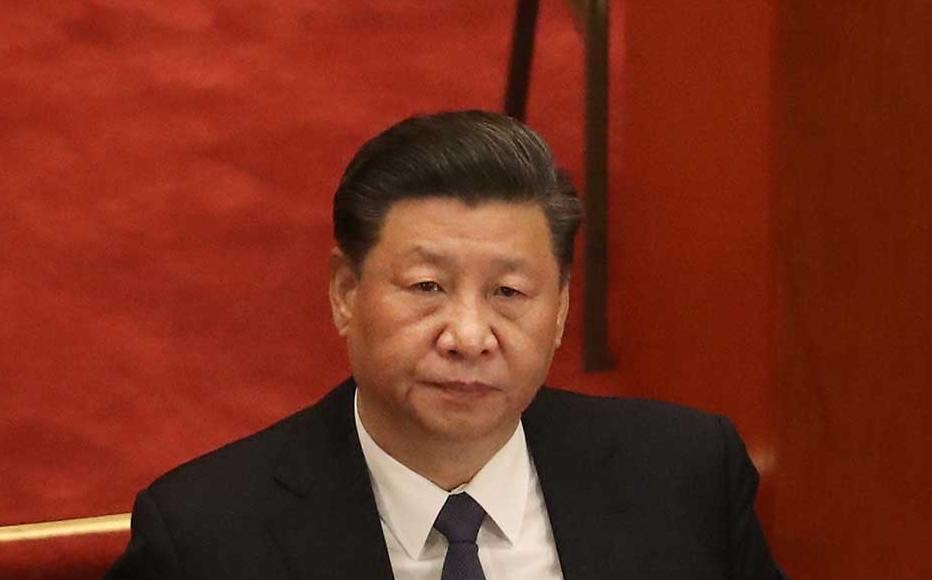
On May 5, at a meeting of the Standing Committee of the Political Bureau, Xi Jinping announced that the Party would “unswervingly insist upon the “dynamic Zero COVID” general policy (毫不动摇坚持“动态清零”总方针). Furthermore, Xi instructed the Party to engage in “struggle” against those who distorted, doubted or denied his COVID policies.
In July, in a speech to important provincial level CCP cadres who attended a meeting “Studying the Spirit of General Secretary Xi Jinping’s Important Speech; and Welcoming the 20th Party Congress,” Xi extolled the “zero COVID” as the “people’s war” against COVID as a competition with the fight to control the pandemic in the world:
“In light of the sudden emergence of COVID, we resolutely put the People first, put life first, and started a counter-attacking People’s War against the virus, a comprehensive war, a defensive war, protecting the People’s lives and health to the greatest extent possible, and with our comprehensive economic development and virus prevention measures achieving the best results in the world”.
Unless Xi personally declares this “People’s War” victorious, the system under his control is unlikely to slow down in reinforcing his political will despite clear evidence of his policy’s disastrous outcome. Having consolidated his clutch to power at the October CCP Congress, Xi has given no sign of abandoning his “Zero COVID” policy, but rather vigorously defended it despite the fact that his “war” has practically put his political and ideological needs first, at a huge cost to the people, to human life, wreaking havoc with the country’s economy.
“The ‘Zero COVID’ policy presents the first major challenge of Xi’s third term: is Xi capable of recognizing his errors and changing course? Xi should immediately change China’s COVID policies on the basis of the best science available. As far as human rights are concerned, Chinese authorities must stop the use of all tracking apps of the 1.4 billion people, which have proven to be prone to abuse,” said William Nee, CHRD Research and Advocacy Coordinator.
“The international human rights community must push for an immediate end to all lockdowns, especially in the Uyghur region and Tibet, and end censorship, including on all COVID-19 related topics,” said Renee Xia, CHRD Director. “If Xi really meant to put the people first, put life first, then he must dismantle the country’s COVID measures that have completely disregarded people’s basic needs and human life.”
A sound COVID policy and effective measures must ensure protection of vulnerable populations, including children, the elderly, persons with disabilities, ethnic minorities, those with preexisting life-threatening medical conditions, and protect democratic participation, allowing free expression of those affected by the policies.
